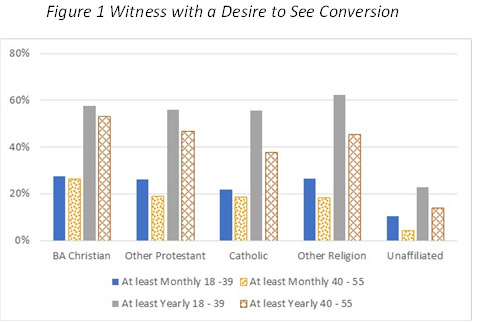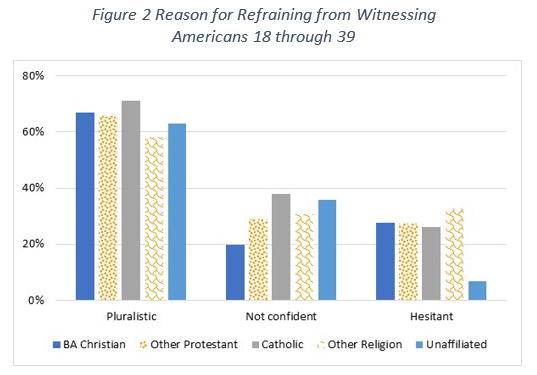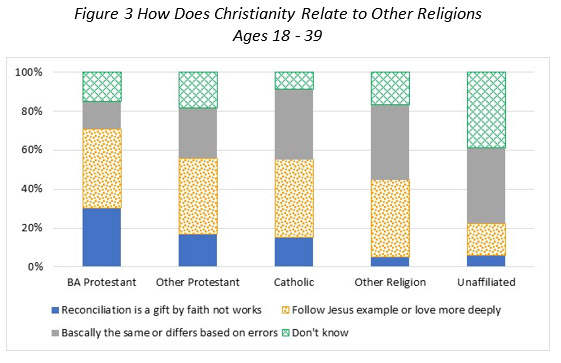Dr. Michael Gleghorn provides an insightful examination of how legendary Christian author C.S. Lewis used his writing to invite his readers to put their faith in Jesus Christ.
Lewis and Evangelism
“C. S. Lewis never invited unbelievers to come to Jesus. He was a very successful evangelist.” So begins Michael Ward’s essay “Escape to Wallaby Wood: Lewis’s Depictions of Conversion.” Ward follows up this provocative comment with others like it. For example, “Einstein failed his entrance exam to the Federal Polytechnic. He was a very successful physicist.”{1} What is Ward wanting us to see here?
While he recognizes that his initial statement about Lewis needs some qualification, he’s nonetheless put his finger on something very important about Lewis’s evangelistic style. For while Lewis had a heart for evangelism, and desired to see men and women surrender their lives to Christ, he’s not the sort of person one would typically think of when hearing the term “evangelist.” One might readily describe Lewis as a Christian apologist or imaginative storyteller, a literary scholar or skillful debater, but “evangelist” would probably not top the list. Nevertheless, it’s important to remember that Lewis engaged in evangelistic activity in a variety of ways. While he was certainly not a “preaching” or “revivalistic” sort of evangelist, he was a “very successful evangelist” all the same.
Philip Ryken has helpfully described Lewis as a “teaching evangelist,” a “praying evangelist,” and a “discipling evangelist.” Most important of all, however, he refers to Lewis as a “writing” or “literary evangelist.” And this is surely correct, for Lewis’s greatest “evangelistic impact” has been felt through his books and essays.{2}
Not long before his death, Lewis was interviewed by Sherwood Wirt of the Billy Graham Evangelistic Association. When asked if the aim of Christian writing (including his own writing) was to bring about an encounter between the reader and Jesus Christ, Lewis responded by saying, “That is not my language, yet it is the purpose I have in view.”{3} Moreover, in his “Rejoinder to Dr. Pittenger,” Lewis frankly confesses that most of his popular Christian books “are evangelistic” in character, and addressed to those outside the Christian faith.{4}
Of course, Lewis was not merely a “literary evangelist.” While such terminology captures the fundamental way in which Lewis shared his faith, it was certainly not the only way. Moreover, evangelism was not something Lewis did simply because he enjoyed it. He felt an obligation, even a burden, to make Christ known to others.{5} And as we’ll see later, these evangelistic concerns and motivations came with a very real cost to Lewis in terms of his professional career and friendships.{6}
The Significance of Lewis’s Conversion
If there’s one thing Lewis makes clear about his own conversion, first to theism and then to Christianity, it’s that he felt himself to have been pursued by God and drawn into relationship with Him. While in one sense he saw his conversion as arising from a “wholly free choice” on his part, he also saw it as resulting from a kind of Divine necessity.{7} Lewis makes this clear in his spiritual autobiography, Surprised by Joy.
Consider the description of his conversion to Theism: “You must picture me alone in that room in Magdalen, night after night, feeling, whenever my mind lifted even for a second from my work, the steady, unrelenting approach of Him whom I so earnestly desired not to meet.” Eventually, Lewis tells us, he “gave in, and admitted that God was God, and knelt and prayed,” describing himself as “perhaps, that night, the most dejected and reluctant convert in all England.”{8}
Interestingly, before this, Lewis had described God as offering him “a moment of wholly free choice”—an opportunity to either “open the door or keep it shut.” He tells us that he chose to open it, but almost immediately relates that “it did not really seem possible to do the opposite.” He goes on to speculate that perhaps “necessity” is not “the opposite of freedom.”{9} All of this reveals how significant Lewis found God’s involvement in his conversion to actually be.
His conversion to Christianity is similarly, if less dramatically, narrated. He writes of feeling “a resistance almost as strong as” his “previous resistance to Theism.”{10} But having been through something similar already, the resistance was “shorter-lived.” While being driven to Whipsnade Zoo, Lewis came to believe “that Jesus Christ is the Son of God.” He once again speculates about whether this momentous event resulted from freedom or necessity and concludes that maybe the difference in such a case is inconsequential.{11}
But why is this important for a discussion of Lewis and evangelism? Because it helps us understand how Lewis (on the one hand) could work tirelessly for the salvation of others, while also (on the other) recognizing that God was so powerfully involved in the conversion of a human soul that he (i.e., Lewis) need never worry that such weighty matters depended solely on him. He could thus be a relaxed evangelist, using his gifts to point others to Christ, while also recognizing that salvation is ultimately a work of God.
The Importance of “Translation” in Lewis’s Evangelistic Work
So far, we’ve seen that the most important of Lewis’s evangelism was through his writings. Indeed, the first book Lewis wrote, after becoming a Christian, was The Pilgrim’s Regress. Published in 1933, the book bears the rather lengthy subtitle: “An Allegorical Apology for Christianity, Romanticism, and Reason.” And as with so many of the books that followed Lewis’s conversion, it was concerned to commend Christianity to others.
In 1938, Lewis published the first volume of his “Cosmic Trilogy,” titled Out of the Silent Planet.{12} In this book, Lewis communicates elements of Christian theology within the context of a science-fiction adventure story. In 1940, he published The Problem of Pain, a work of Christian apologetics concerned to address the problem of evil and suffering. As I’ve noted elsewhere, this book “attracted the attention of James Welch, the Director of Religious Broadcasting for the . . . BBC.”{13} Welch wrote to Lewis, asking if he might be willing to compose a series of broadcast talks for the BBC. Lewis accepted the invitation, and the talks he composed eventually became the first book of his now classic statement of basic theology, Mere Christianity.{14} These influential talks were delivered during the years of World War II.
In addition to these now-famous “broadcast talks,” Lewis also spoke to the men and women of the Royal Air Force during the war. Such experiences helped teach Lewis the importance (and even necessity) of “translating” Christian doctrine into terms the average layperson could readily understand. Lewis wanted to communicate Christian truth to his audience, and he realized that to do so effectively, he needed to learn their language.{15} He thus described his task as “that of a translator—one turning Christian doctrine . . . into language that unscholarly people would attend to and could understand.”{16}
It was Lewis’s skill as a “translator” that made him so successful as a “literary evangelist.” Few writers have been so effective at communicating the essential truths of Christianity to a broad, general, and often unbelieving audience, as C. S. Lewis. Indeed, Lewis placed so much importance on “translating” Christian truth into the language of the average layperson that he thought every ordination exam ought to require that the examinee demonstrate an ability to do it.{17} And in Mere Christianity (along with other works), we get a glimpse of Lewis doing this very thing.
Evangelism in Lewis’s Fiction
In discussing the evangelistic work of C. S. Lewis, we’ve seen how Lewis’s evangelistic concerns impacted his work as a popular Christian apologist. Now it’s time to consider how these same concerns find expression in his fiction. In his essay, “Sometimes Fairy Stories May Say Best What’s to be Said,” Lewis discusses a major motivation for his fictional work. He tells us:
“I wrote fairy tales because . . . I thought I saw how stories of this kind could steal past a certain inhibition which had paralysed much of my own religion in childhood. Why did one find it so hard to feel as one was told one ought to feel about God or about the sufferings of Christ? I thought the chief reason was that one was told one ought to. An obligation to feel can freeze feelings. And reverence itself did harm. The whole subject was associated with lowered voices; almost as if it were something medical. But supposing that by casting all these things into an imaginary world, stripping them of their stained-glass and Sunday school associations, one could make them for the first time appear in their real potency? Could one not thus steal past those watchful dragons? I thought one could (OOW, 37).{18}
Through his fiction, Lewis helps his readers personally experience the potency of Christian truth. Consider The Lion, the Witch, and the Wardrobe. In that story, Edmund (one of the four Pevensie children who enter Narnia through the wardrobe) initially sides with the White Witch against the great lion Aslan. The Witch has all Narnia under her spell, making it “always winter and never Christmas.”{19} In his desire to one day be king of Narnia, Edmund betrays his brother and sisters. According to the Deep Magic that governs Narnia, he thus deserves to die.{20}
But Aslan, the true king of Narnia, intercedes for Edmund, and the Witch renounces her claim on his life. The catch is that Aslan must give his own life in place of Edmund’s. This he willingly does. But like Jesus in the Gospels, death cannot hold him in its power, and he returns to life again. According to one scholar, “the desired response” to this is not so much “to believe in the vicarious suffering of Christ, but to taste it.”{21} Lewis thus used his fiction as a vehicle for evangelism, helping his readers to “taste” Christian truth in powerful (and even delightful) ways.
The “Cost” of Lewis’s Evangelistic Witness
Although Lewis was not the sort of person one would typically think of when hearing the term “evangelist,” he nonetheless had a heart for evangelism and was motivated to labor for the conversion of others. In fact, Christopher Mitchell has observed that “Lewis perceived evangelism to be his lay vocation, and the means by which he expressed this evangelistic impulse were his speaking and writing.”{22}
While Lewis was not the sort of person to preach a conventional “Come to Jesus” sort of evangelistic sermon, he was nonetheless (as Michael Ward has noted) “a very successful evangelist.”{23} When one considers the vast literary output of Lewis, so much of which had evangelistic intentions, combined with his speaking, preaching, and debating on issues of vital concern to the Christian faith, along with his many prayers for the conversion of others, and generous financial assistance rendered for the cause of Christ, it is clear that the whole tenor of Lewis’s post-conversion life was driven by a strong evangelistic impulse for the salvation of souls. And this in spite of the very costly nature of this witness.
According to Mitchell, Lewis’s evangelistic commitments fostered “ridicule and scorn . . . among his non-Christian colleagues” at Oxford.{24} Indeed, even some of Lewis’s closest friends occasionally felt embarrassed by his “zeal for the conversion of unbelievers.”{25} Many of his colleagues were scandalized by the fact that Lewis used his academic training to write popular-level books in theology and Christian apologetics. No doubt some were also jealous of his ever-increasing popularity with the general public, for Lewis had an uncanny ability to write one book after another that people actually wanted to buy and read.
So why did Lewis do it? That’s the question Mitchell asks near the end of his essay on this topic.{26} Why did Lewis persist in evangelistic writing and speaking that aroused such scorn from academic colleagues, and occasional embarrassment from friends? Mitchell suggests that it likely had something to do with Lewis’s conviction that “There are no ordinary people.”{27} Hence, while his evangelistic activities created difficulties for him, difficulties that might easily have been avoided, Lewis was convinced that bringing glory to God through the saving of human souls was “the real business of life.”{28} And whatever abuse, scorn, or discomfort this might cause him personally, he was apparently willing to endure it in order to be found faithful.
Notes
1. Michael Ward, “Escape to Wallaby Wood: Lewis’s Depictions of Conversion,” in Lightbearer in the Shadowlands: The Evangelistic Vision of C. S. Lewis, ed. Angus J. L. Menuge (Wheaton, IL: Crossway Books, 1997), 143.
2. See Philip G. Ryken, “Winsome Evangelist: The Influence of C. S. Lewis,” in Lightbearer in the Shadowlands, 62.
3. C. S. Lewis, “Cross-Examination,” interview by Sherwood E. Wirt, in God in the Dock, ed. Walter Hooper (Grand Rapids, MI: Eerdmans, 1970), 262.
4. C. S. Lewis, “Rejoinder to Dr. Pittenger,” in God in the Dock, 181.
5. This would seem to be implied by Lewis’s remarks in his sermon, “The Weight of Glory,” in The Weight of Glory and Other Addresses, ed. Walter Hooper (New York, NY: Macmillan, 1980), 18-19.
6. See Christopher W. Mitchell, “Bearing the Weight of Glory: The Cost of C. S. Lewis’s Witness,” in The Pilgrim’s Guide: C. S. Lewis and the Art of Witness, ed. David Mills (Grand Rapids, MI: Eeerdmans, 1998), 3-14.
7. C. S. Lewis, Surprised by Joy: The Shape of My Early Life (New York, NY: Harcourt Brace Jovanovich, 1955), 224-25.
8. Ibid., 228-29.
9. Ibid., 224-25.
10. Ibid., 237.
11. Ibid.
12. For readers interested in reading my prior article on this book, please see Michael Gleghorn, “Smuggling Theology into Out of the Silent Planet,” Probe Ministries, October 29, 2023, probe.org/smuggling-theology-into-out-of-the-silent-planet/
13. Please see Michael Gleghorn, “C. S. Lewis, the BBC, and Mere Christianity,” Probe Ministries, April 24, 2016, probe.org/c-s-lewis-the-bbc-and-mere-christianity/
14. For a helpful discussion of all the issues and concerns surrounding these events, please see Justin Phillips, C. S. Lewis in a Time of War: The World War II Broadcasts that Riveted a Nation and Became the Classic Mere Christianity (New York: HarperCollins Publishers, 2002).
15. C. S. Lewis, “Christian Apologetics,” in God in the Dock, 94, 98.
16. Lewis, “Rejoinder to Dr. Pittenger,” in God in the Dock, 183.
17. Lewis, “Christian Apologetics,” in God in the Dock, 98-99.
18. C. S. Lewis, “Sometimes Fairy Stories May Say Best What’s to be Said,” in Of Other Worlds: Essays and Stories, ed. Walter Hooper (Orlando, FL: Harcourt Brace, 1975), 37.
19. C. S. Lewis, The Lion, the Witch and the Wardrobe (New York: Macmillan, 1970), 16.
20. Ibid., 138-39.
21. Doris T. Myers, C. S. Lewis in Context (Kent, OH: Kent State University Press, 1994), Kindle edition, loc. 2640.
22. Christopher W. Mitchell, “Bearing the Weight of Glory: The Cost of C. S. Lewis’s Witness,” in The Pilgrim’s Guide: C. S. Lewis and the Art of Witness, ed. David Mills (Grand Rapids, MI: Eerdmans, 1998), 3.
23. Ward, “Escape to Wallaby Wood,” 143.
24. Mitchell, “Bearing the Weight of Glory,” 7. Note: The whole of this paragraph is indebted to Mitchell’s discussion in this chapter.
25. Ibid., 6-7.
26. Ibid., 9-14.
27. C. S. Lewis, “The Weight of Glory,” 19.
28. C. S. Lewis, “Christianity and Culture,” in Christian Reflections, ed. Walter Hooper (Grand Rapids, MI: Eerdmans, 1994), 14.
©2025 Probe Ministries


 Looking at the detailed results, all religions except the Unaffiliated showed very similar results: over 20% (1 in 5) of those witnessed at least monthly and about half witnessed at least yearly. So, it would appear that there is a lot of witnessing going on with very few conversions.
Looking at the detailed results, all religions except the Unaffiliated showed very similar results: over 20% (1 in 5) of those witnessed at least monthly and about half witnessed at least yearly. So, it would appear that there is a lot of witnessing going on with very few conversions. We also asked the question: “When I refrain from communicating my religious belief with someone, it’s usually because:”
We also asked the question: “When I refrain from communicating my religious belief with someone, it’s usually because:” The results are charted in the graph to the right. First, notice the interesting result that only about 30% of Born Again Protestants selected ‘reconciliation is a gift’ while 40% selected following Jesus’ example or love others more deeply. As noted above, this second answer is not inconsistent with the concepts of Christianity but is not as fundamental as the first. However, selecting this answer over reconciliation is a gift’ is consistent with what we saw earlier: 70% of Born Again Christians are not exclusivists.
The results are charted in the graph to the right. First, notice the interesting result that only about 30% of Born Again Protestants selected ‘reconciliation is a gift’ while 40% selected following Jesus’ example or love others more deeply. As noted above, this second answer is not inconsistent with the concepts of Christianity but is not as fundamental as the first. However, selecting this answer over reconciliation is a gift’ is consistent with what we saw earlier: 70% of Born Again Christians are not exclusivists.